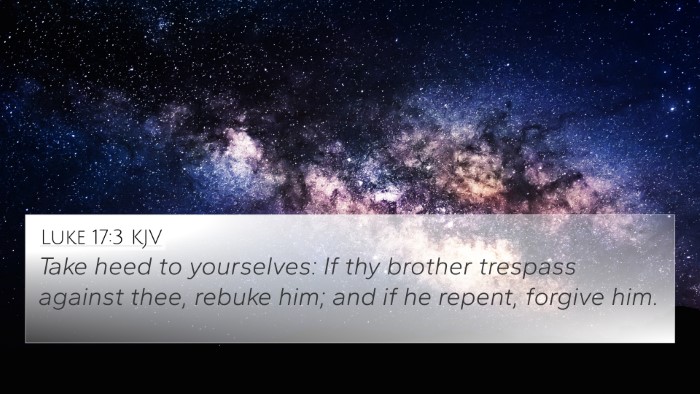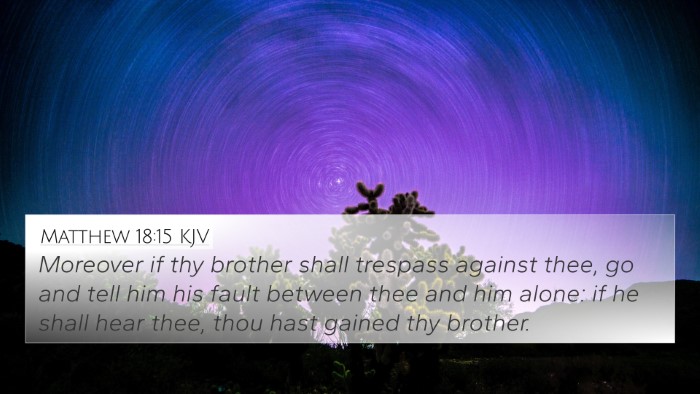Understanding Matthew 18:21
In Matthew 18:21, we encounter a question posed by Peter to Jesus, which serves as a catalyst for teaching on the nature of forgiveness. This verse brings forth the rich biblical themes of mercy, grace, and the necessity of forgiving others, reflecting God's own forgiveness toward humanity.
Matthew 18:21 states:
"Then came Peter to him, and said, Lord, how oft shall my brother sin against me, and I forgive him? till seven times?"
Summary of Insights from Commentaries
- Matthew Henry:
Henry emphasizes Peter's desire to be generous in forgiveness, suggesting that forgiving someone seven times exceeds the common expectations of the law, hinting at the need to offer boundless forgiveness beyond human limitations.
- Albert Barnes:
Barnes points out that Peter's question reflects a common Hebrew maxim where forgiveness was often limited. This question opens the door for Jesus to discuss the limitless nature of forgiveness that is required from His followers.
- Adam Clarke:
Clarke translates the spirit behind Peter’s inquiry as a longing for understanding the depths of forgiveness. He suggests that Peter’s number is ironically generous, yet Jesus' response will reveal a far greater standard for forgiving others.
Thematic Connections
This verse is foundational in understanding how the theme of forgiveness permeates the Scriptures. Several other Bible verses directly relate to the teachings found in Matthew 18:21:
- Luke 17:3-4: Here, Jesus amplifies the call to forgiveness, stating if a brother sins and repents, forgiveness must be extended repeatedly.
- Ephesians 4:32: Paul instructs believers to be kind and forgiving as God forgave them, emphasizing the relational aspect of mercy.
- Colossians 3:13: This passage reinforces the principle of forgiving one another, akin to the forgiveness that believers have received from Christ.
- Matthew 6:14-15: These verses underscore that God’s forgiveness of our sins is contingent upon our willingness to forgive others.
- 2 Corinthians 2:10-11: Paul discusses the act of forgiving a repentant sinner, reflecting the church's responsibility toward reconciliation.
- Proverbs 17:9: This verse states that love covers all offenses, supporting the view that forgiveness promotes unity.
- James 2:13: It highlights that mercy triumphs over judgment, linking closely to the necessity of forgiving others.
- 1 Peter 4:8: Peter encourages love to cover a multitude of sins, resonating with the idea that forgiveness fosters community.
- Mark 11:25: Jesus instructs to forgive while praying, indicating that our spiritual relationship hinges on our readiness to forgive others.
- Romans 12:19: This verse emphasizes trusting God for vengeance, allowing believers to focus on forgiveness rather than retribution.
Exploring the Depth of Forgiveness
The narrative surrounding Matthew 18:21 leads us into a deeper discussion of the nature of God’s forgiveness. The insights provided by the aforementioned commentaries help us to anchor our understanding in both the context of Peter's inquiry and Jesus' profound response, which follows in verse 22:
"Jesus saith unto him, I say not unto thee, Until seven times: but, Until seventy times seven."
Here, Jesus is not merely advocating for a specific number but rather an infinite attitude of forgiveness that reflects the nature of God's grace towards us. This radical call to forgive illustrates the transformative power of grace in believers' lives, underscoring that forgiveness is not just an act but a way of life.
Comparative Analysis with Other Scriptures
When analyzing Matthew 18:21 in conjunction with the other scriptures mentioned, we start to see a pattern and theme emerge regarding the attitude of the heart. Many of these verses reinforce the idea that forgiveness is essential to the Christian faith. These connections highlight the biblical understanding that:
- Forgiveness is required: Across various teachings of Jesus and apostolic letters, there is a consistent call to forgive freely.
- Forgiveness reflects God's character: The act of forgiving mirrors God’s unfathomable mercy and love for humanity.
- Forgiveness promotes community: The imperative to forgive strengthens relationships within the body of Christ, fostering a spirit of unity and peace.
Applying the Teachings of Forgiveness
Understanding the depth of this teaching about forgiveness is vital for the believer's life. Here are some practical applications for applying these teachings:
- Self-Reflection: Encourage individuals to assess their relationships and identify areas where they may need to extend forgiveness.
- Prayer for Help: As forgiveness can be challenging, praying for the strength to forgive others can be an essential step.
- Live in Forgiveness: Adopting an attitude that seeks to forgive before harboring resentment will align one’s heart closer to God’s desires.
- Sharing Forgiveness: Testifying about one’s journey of forgiveness can encourage others facing similar struggles.
Conclusion
In conclusion, Matthew 18:21 serves as a profound reminder of the essence of forgiveness in the life of a believer. Linking this verse with others not only enriches our understanding but also emphasizes the call to reflect God’s character in our interactions with others. By engaging with these scriptures and their themes, believers can cultivate a spirit of mercy and grace that embodies the Gospel.




